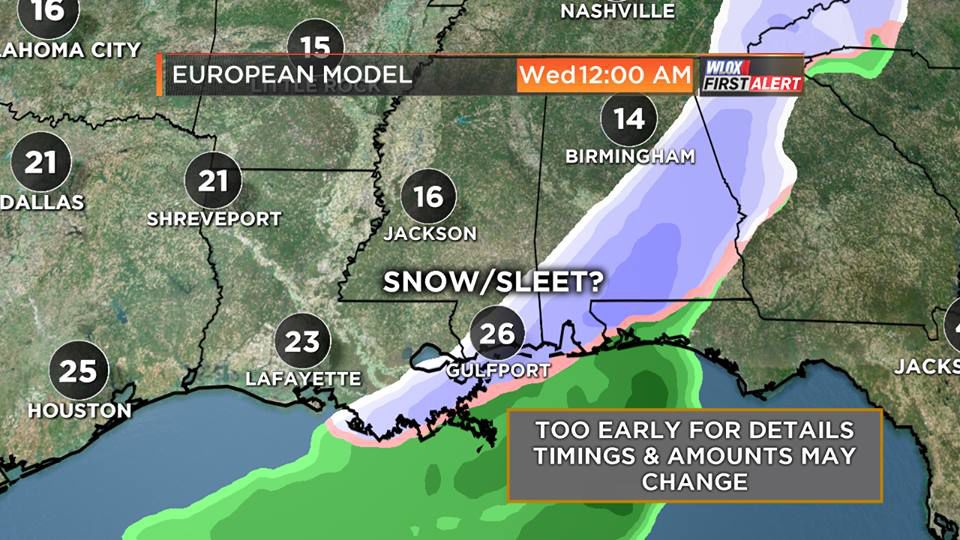
The Business of Family
January 13, 2018
Here we go again: Models show possible snow on Wednesday morning
January 13, 2018Lockport native Pete Wilson pushes his basket of groceries down Aisle 3 and toward the back of locally owned Frank’s Supervalu on a warm Wednesday afternoon in southeastern Louisiana.
While there, he takes a look at the meat the store has on display.
The New Orleans Saints are playing a big playoff game that weekend and Wilson his eyes firmly set on a big barbecue for he, his neighbors and other close friends and family.
“How ‘bout them Who Dat’s?” Wilson asks with a smile to a butcher in the store, while combing through the store’s ribs, looking for a pack that catches his eye.
“What a game!” the store employee says back. “I hope they can win on Sunday and keep rolling.”
Wilson finishes his small-talk, then treks to the cashier to finish his shopping for the day.
At the check-out register, he talks to the cashier about the weather and how crazy it’s been.
She smiles and answers back that, “it’s no wonder everyone has been sick lately.”
Wilson said he knows that by avoiding a big box store, he’s agreeing to pay a little more when buying groceries, toiletries and other supplies.
But he doesn’t care.
Because what he loses by paying a few extra dollars, he gains by receiving quality customer service, while enjoying a pleasurable experience while in the store.
Wilson is one of many locals we questioned this week at local family-owned stores, asking each why they opt to go local over chain franchise stores.
The answers varied for each, but general themes were customer service, friendly employees and a general feeling that by shopping at the family store, one was helping a neighbor, instead of a stranger.
“I don’t go to the big guys – very rarely, if ever,” Wilson said. “I feel much more at home with a local, family-based provider. You can just tell that it’s different. You’re dealing with real people – folks who live in the community with you. That might not matter to some people, but it matters to me. I like to see people I know and can talk to. That means a lot to me.”
That friendly, “at home” type vibe came up often among those we asked.
Houma native Sue Bethancourt said she buys local and does as much business as she can with businesses that a family-run and operated.
In the work force, Bethancourt said she’s also worked for larger corporations, but also for smaller mom and pop shops as a marketer.
When asked to compare the two – both as a consumer and an employee, Bethancourt said very quickly that there is no comparison.
“The business that’s rooted in your neighborhood is always better,” she said. “They take care of you better – every step of the way. There’s nothing like real people communicating with real people. It’s almost a lost art in our world.”
Service matters, too.
Galliano man Bobby Adams said he shops local for everything he can – from oil changes to groceries to items like appliances and bedding, as well.
When asked why, he said the reason was because of the ability to sit down and talk with a real person during the process – before, during and after a sale.
“I can’t walk into a website and look into a person’s eyes and see if what they are telling me is true,” Adams said. “But I can do that at the stores here. I can go to Kief Hardware in Cut Off and buy tools and talk to real, Cajun people. That is important to me and my business.”
Thibodaux native Becky Dillon agrees, adding that she learned the hard way this holiday season just how important service can be to a sale. Trying to be a diligent, early-bird shopper, she bought a number of items from Amazon for Cyber Monday – purchases which became Christmas presents for friends and family.
Dillon, a middle-aged housewife, said she is relatively new with online shopping, but had heard nothing but great things from friends and family.
“It sure is easy – I’ll tell you that,” she said. “With a click, you can buy almost anything from home.”
But Dillon’s online experience got mixed reviews.
One of her items didn’t fit and the return process was tedious, if not downright difficult because of difficulty getting a service rep on the phone.
Another item shipped late and didn’t get to her home until after Christmas – even though she bought it several weeks before the holiday.
“I learned my lesson,” she said. “I’ll be going back to the boutiques next year for my gifts. If something sounds like it is too good to be true, it probably is. This was easy, but the service stopped after the sale. At a locally owned business, I would have had fewer headaches in the long run.”
ECONOMIC IMPACTS GREAT, AS WELL
Shopping local does more than just give a feel-good experience to customers.
It helps an area’s economy, too.
Multiple economic studies have been done over the past 20 years, measuring the difference between a purchase at a locally owned business versus one made at a corporation or chain.
According to The Institute for Local Self Reliance (ILSR), the economic impacts are huge.
In a study they conducted in 2013, ILSR said that for every $1 million in sales at a chain store, $170,000 is generated in local economic activity.
In comparison when the same $1 million in sales is generated at a locally owned, independent retail store, the local economic activity more than doubles, jumping to $450,000.
The study also said that local, family-based businesses generally pay more competitively and are more likely to offer better insurance plans, retirement, 401K and savings opportunities, which causes more people to stay in an area long-term, which sparks growth.
Another study, done by the Andersonville Study of Retail Economics, digs deeper into statistics in an effort to show how important it is to be a local shopper.
In that study, they concluded that local businesses generate 70 percent more local economic activity per square foot than big box stores, while also practicing safer, more environmentally friendly practices to produce their products. •













